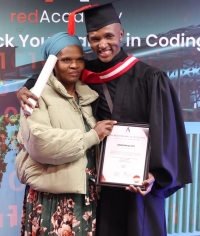A graduation ceremony in Cape Town in late May marked the culmination of a year-long effort - a Career Sprint - aimed at equipping young people from surrounding communities with the hard and soft skills needed to ignite their careers in the Information Technology sector. More than just a qualification, the programme has led to qualifying youth being employed by a leading local technology company.
Even as South Africa (and the rest of the world) embraces the infusion of technology into products and solutions across multiple industries as well as all aspects of life, a challenge locally is the critical shortage of skills, especially in the area of software development. However, tackling this challenge can act as the catalyst to solving both the shortage of scarce software developer skills as well as South Africa’s long-standing youth unemployment problem.
redAcademy is an innovative skills and experiential learning hub that specialises in teaching coding and technology skills through its SETA-accredited year-long programme. By collaborating with South African businesses facing a massive skills gap, the organisation’s purpose is to build a sustainable tech talent pipeline for the future, thereby fulfilling local and global IT market recruitment needs.
Emmanuel Madzunye, Senior Software Development Lecturer at redAcademy, says it was an easy decision to join the organisation as they shared a common purpose: “redAcademy is giving young people - our Sprinters - an opportunity to change their lives. I wanted to assist these young people who are being given this chance, to guide them to make the most of the incredible opportunity.”
A focus on attitude, not qualifications
Rather than prioritising qualifications, the focus is on attitude - there is a demand for problem solvers who are quick to learn, adaptable, dedicated, accountable, responsible and take pride in their work - and this has not only opened up a world of opportunities for the youth, but also gives organisations access to a much larger pool of talent to source from than ever before.


Casting the recruitment net wider brings opportunities for youth who are attracted to a career in software development but have lacked the funds to complete a traditional tertiary education qualification. One such example is Simbongile Dyi, a youngster from Eersterivier who began his working life in the construction industry, before being told about redAcademy by a mentor - who also helped with his application submissions.
“At first I was nervous because I had no background in the field so my knowledge was zero about coding or the IT industry, but the teachings of facilitators like Mr. Emmanuel Madzunye made it possible for me to see that I could do it. Then as time went by, I became better and better, and realised the support I was getting was not only about coding but also about life lessons and soft skills,” says Dyi.
Another example is Athenkosi Mhlekwa, who had some previous experience in the field, but wanted to take it further. "My former college lecturer called and told me about this amazing opportunity. It directly links to my previous studies where I had learned about information technology and I feel there will be a lot of opportunities for me to grow my career. The highlight was connecting with experienced software developers, business analysts and solution architects."
Developing work-ready talent
Beyond simply equipping youth with software development training and theoretical knowledge, they are also provided with the practical, real-world experience of working alongside professional developers on projects for real clients, using their specific technology stacks. It's a different approach, and one that is appreciated by the programme participants.
"Comparing this one year with redAcademy versus a three-year programming study in varsity: The biggest difference I found is that varsity and college don't offer such an experience, like working on the live-client projects, they only do small projects and assignments," says Dyi.
Mhlekwa adds that what she enjoyed most was the interactive learning environment and the opportunity to engage in hands-on exercises and apply theoretical concepts in real-life scenarios. Additionally, he said that group projects or team-based activities also encouraged collaboration, problem-solving, and creativity, and helped to prepare him well for his first professional role.
Madzunye explains that a blend of theory and practicals has been key: “Theory is obviously important. But imagine I gave you all the theory about how to drive a car. Would you just be able to climb in and drive? There’s no better learning than doing, and so the experiential learning we do at redAcademy literally sprints young people to being career-ready because we match theory with real-world practice, on real projects, in real businesses.”
Looking to the future
The graduation ceremony at the end of May saw eleven young people graduate from the Career Sprint programme - achieving the ‘Red Standard of Excellence, and accelerating their careers from unemployed a year ago, to having jobs as junior software developers at redPanda Software.
The methodology used by organisations such as redAcademy are going to become more crucial going forward: many large multinational organisations are hiring based on skills rather than looking at traditional educational qualifications - and it won't be too long before that trend hits home. If they are to remain globally competitive, South African companies will have to adopt new approaches developing scarce talent. It might even give them an advantage; compared to talent selected based on their level of qualification and degrees, Sprinters will more likely be able to 'hit the ground running'. The sooner they change how they recruit, the better.














